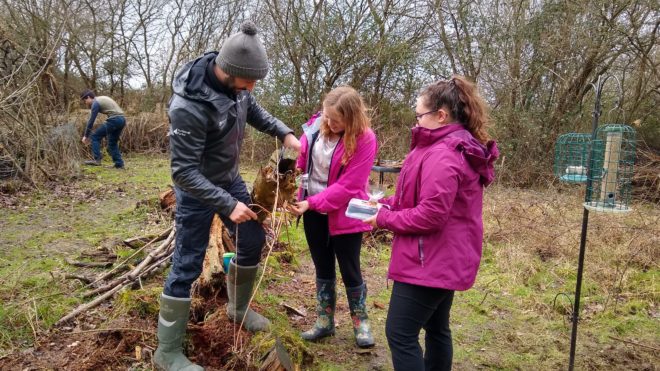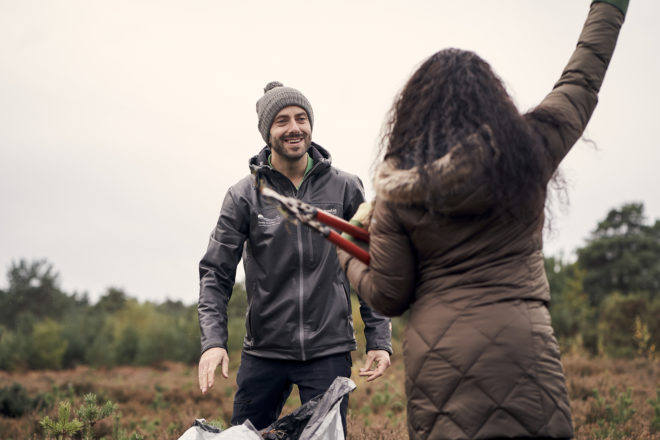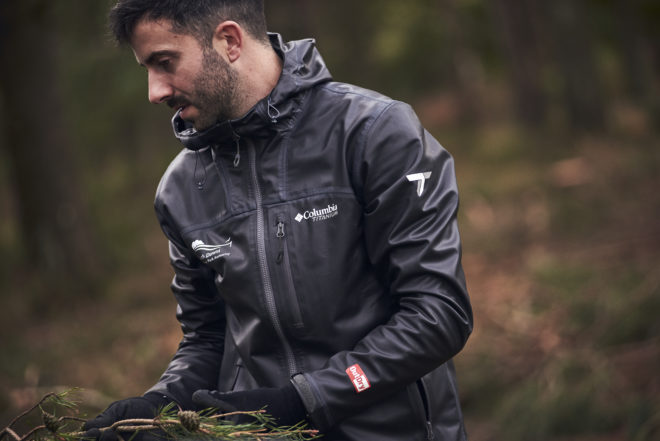Most asked: Charles Winchester, South Downs National Park Ranger
August 6, 2020
Can you tell us a little about what you do?
 I’m a Ranger for the South Downs National Park. I have a ‘patch’, or area, of the Park that I’m responsible for, and within that area I work with a range of partners – from farmers, to large estates, to other conservation organisations, like the RSPB and the National Trust – to conserve and enhance the amazing and diverse landscape of the South Downs.
I’m a Ranger for the South Downs National Park. I have a ‘patch’, or area, of the Park that I’m responsible for, and within that area I work with a range of partners – from farmers, to large estates, to other conservation organisations, like the RSPB and the National Trust – to conserve and enhance the amazing and diverse landscape of the South Downs.
Which in practical terms might mean leading a conservation volunteer group to clear invasive scrub from a heathland, organising contractors to help re-profile and re-wild a stretch of river channel with the help of an excavator, or getting my hands dirty and installing some livestock fencing so a site can be grazed in order to manage and enhance it.
What is a typical day like for you?
That’s a tough one! The honest answer is that as a National Park Ranger no day is ever the same. And that’s really the beauty of the job. One day might involve lots of meetings with partners in order to plan a project, while the next might mean getting my waders on and jumping – or should I say gracefully climbing? – into a river to monitor its invertebrate populations.
Today, for example, apart from writing some answers to these questions, I’ll be talking to an ecologist and a local farmer to arrange to creation of a new area of chalk grassland. Tomorrow? Who knows!
What is the best thing about your job/working in the National Park?
 The best thing has to be the feeling that you’re giving something back, to both the landscape, its wildlife and – hopefully – to the people that live, work and visit the area.
The best thing has to be the feeling that you’re giving something back, to both the landscape, its wildlife and – hopefully – to the people that live, work and visit the area.
There aren’t many jobs that give you the opportunity to consistent see the immediate positive impacts of a practical piece of work first hand, on the ground. That’s pretty unusual and certainly not something I take for granted.
What do you think helped you to bag this position?
I get asked that quite a bit! And it’s not that easy to answer. I think there are a few important things though that might’ve helped.
First is practical experience. Having put in the hours, days, weeks doing practical conservation work – whether as a volunteer, or as a paid job – is critical. I was fortunate enough to have had the chance to do this both as a volunteer for the RSPB, BTCV and Butterfly Conservation, as well as through the work I did – and continue to do – on my family’s farm.
I think the second thing is a diversity of experience in the environmental sector. Before starting work as a Ranger I did a variety of jobs, from analysing on European Environmental Policy in Brussels for Conservation International, to doing climate change field and lab work in Australia, to helping set up urban farms for underprivileged groups in the United States.
All of these roles gave me an understanding of the environment, both at home and abroad, and experience of working for and with a diverse range of people and organisations to achieve common goals – something which the National Park is all about.
Finally, I don’t think you can discount the importance of passion. If you want to get into conservation, and maybe even work as a National Park Ranger, passion for, and understanding of, the environment and what you’re trying to achieve will help no end. I certainly think it helped me.
Tell us something we might not know about your job/area of work?
 As a National Park Ranger it’s not uncommon to get some pretty odd requests. Perhaps the strangest I’ve had since joining the National Park Authority is a phone call from a member of the public asking if I could “sort out an overly aggressive peacock” on the South Downs Way. It turned out to be an unusual species of pheasant (a Reeve’s pheasant, if you’re interested) misidentified by a walker. But it’s certainly one of the more unusual issues I’ve had to deal with… so far anyway!
As a National Park Ranger it’s not uncommon to get some pretty odd requests. Perhaps the strangest I’ve had since joining the National Park Authority is a phone call from a member of the public asking if I could “sort out an overly aggressive peacock” on the South Downs Way. It turned out to be an unusual species of pheasant (a Reeve’s pheasant, if you’re interested) misidentified by a walker. But it’s certainly one of the more unusual issues I’ve had to deal with… so far anyway!
Do you have any tips for young people looking for a similar job in the future?
Be persistent. I’ve applied for a fair few different jobs in my career and most of them I didn’t get. But definitely don’t let it put you off. Conservation is one of the hardest sectors to break into, so you’re going to have to go through some disappointments to get to where you want to be. Just know that when you do finally break through and get the position you’ve always wanted, it’ll be worth it.
